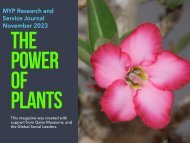The Secret life of Plants
In collaboration with Qatar National Museum, Grade 6 students at Swiss International School Qatar have produced a magazine to preserve oral medical traditions and cultural practices. They also create ethical cosmetics and explore how football stadiums could feed hungry people. We are only young scientists so we do welcome feedback. This is a magazine written by children for children so there will be mistakes. Errata: Zaid's name is misspelled. The author is named Zade.
In collaboration with Qatar National Museum, Grade 6 students at Swiss International School Qatar have produced a magazine to preserve oral medical traditions and cultural practices. They also create ethical cosmetics and explore how football stadiums could feed hungry people. We are only young scientists so we do welcome feedback. This is a magazine written by children for children so there will be mistakes. Errata: Zaid's name is misspelled. The author is named Zade.
Create successful ePaper yourself
Turn your PDF publications into a flip-book with our unique Google optimized e-Paper software.
What is the growing process <strong>of</strong> herbs?<br />
Good news HERBS ARE COMPLETELY NATURAL! But<br />
there is just one catch and it is modern farming so with<br />
confidence I can say it is no secret that modern farming<br />
has adopted intensive practices characterized by heavy<br />
dependence on chemical inputs such as synthetic<br />
fertilizers, herbicides and pesticides aimed at maximizing<br />
herbs grown. <br />
However these practices are the environmental costs that<br />
have so far been enormous ranging from contamination via<br />
chemicals being put into lots <strong>of</strong> water leading to excessive<br />
ecosystem destruction affecting wild<strong>life</strong> plus general<br />
pollution impacts on every environment. Besides,<br />
fertilizers can lead to severe loss <strong>of</strong> nutrients and destroy<br />
quality and this leads to the soils drying up and making this<br />
style <strong>of</strong> farming unsustainable. <br />
without the use <strong>of</strong> artificial pesticides or herbicides, and<br />
this is lowering the likelihood that consumers would eat<br />
harmful chemicals through what they eat. <br />
Higher exposure to important minerals, antitoxins, and<br />
other chemicals from organic crops ensures better<br />
nutrition and improved health for those who eat them. In<br />
the same way, livestock producers follow humane farming<br />
methods, taking into consideration the wellbeing <strong>of</strong> the<br />
animals and banning the use <strong>of</strong> routine antibiotics and<br />
growth hormones to produce products that are chemical<br />
free and encourage the consumption <strong>of</strong> wholesome foods<br />
by people.<br />
But unlike drugs we can avoid this type <strong>of</strong> farming and<br />
change to organic farming. Organic farming is founded<br />
upon the basic and natural principles <strong>of</strong> embracing<br />
different natural systems in search <strong>of</strong> ecological balance<br />
whilst promoting biodiversity in the food they grow. But<br />
organic farming shows the potential <strong>of</strong> mother nature. <strong>The</strong><br />
benefits <strong>of</strong> organic farming are a huge improvement in<br />
human health, which has been regularly noted by<br />
researchers over the years. Also organic foods are grown
















